10 Best Herbal Creams For Eczema

Herbal creams for eczema are natural topical treatments that incorporate plant-based ingredients known for their soothing and anti-inflammatory properties.
Commonly used herbs include chamomile, calendula, and lavender, which can help reduce redness, itching, and skin irritation associated with eczema. These creams are often preferred by individuals seeking alternatives to conventional corticosteroid treatments due to their gentle and potentially fewer side effects. However, it is important to consult a healthcare professional before using herbal creams, as they may not be suitable for all skin types or conditions.
While they can provide relief for mild eczema symptoms, they should not replace medical advice or treatment for severe cases.
Table of Contents
- 1. Aloe vera (Aloe barbadensis)
- 2. St. john's wort (Hypericum perforatum)
- 3. Stinging nettle (Urtica dioica)
- 4. English lavender (Lavandula angustifolia)
- 5. Ginger (Zingiber officinale)
- 6. Field horsetail (Equisetum arvense)
- 7. Marigold (Calendula officinalis)
- 8. Common mallow (Symphytum officinale)
- 9. German chamomile (Chamomilla recutita)
- 10. Camellia (Camellia sinensis)
1. Aloe vera (Aloe barbadensis)

Aloe barbadensis, commonly known as aloe vera, is a popular herbal ingredient used in the formulation of creams for eczema due to its soothing and anti-inflammatory properties.
These creams often contain aloe gel, which is derived from the inner leaf of the aloe plant and is known for its ability to moisturize and repair damaged skin. The natural compounds in aloe vera, such as polysaccharides and enzymes, help reduce redness, itching, and irritation associated with eczema. Many people with eczema find relief using aloe-based creams as a gentle, natural alternative to traditional topical treatments.
However, it is important to consult a healthcare professional before using any herbal remedy to ensure it is safe and suitable for individual skin conditions.
2. St. john's wort (Hypericum perforatum)

Hypericum perforatum, commonly known as St. John's Wort, is a herbal remedy that has been traditionally used for its anti-inflammatory and wound-healing properties.
When formulated into creams, it may offer relief for eczema by reducing redness, irritation, and itching associated with the condition. These creams often contain extracts of the plant's hypericin and other bioactive compounds that help soothe the skin and promote healing. However, it is important to note that St. John's Wort can interact with certain medications, so consulting a healthcare provider before use is advisable.
Despite its potential benefits, more clinical research is needed to fully understand its effectiveness and safety for eczema treatment.
3. Stinging nettle (Urtica dioica)

Urtica dioica, commonly known as stinging nettle, has been traditionally used in herbal remedies for its anti-inflammatory and soothing properties.
Urtica dioica herbal creams are formulated with extracts from the leaves of this plant, which are rich in antioxidants, vitamins, and minerals that may help reduce skin irritation. These creams are often recommended for individuals suffering from eczema due to their ability to calm redness and itching. The natural compounds in stinging nettle can support skin healing and improve overall skin texture.
However, it is important to consult a healthcare professional before using these creams, especially if you have a known allergy to plants in the Urticaceae family.
4. English lavender (Lavandula angustifolia)

Lavandula angustifolia, commonly known as English lavender, is often incorporated into herbal creams for eczema due to its soothing and anti-inflammatory properties.
These creams typically contain essential oils extracted from the dried flowers of the plant, which are known to have calming effects on the skin. The natural compounds in lavender, such as linalool and lavender alcohol, may help reduce redness, itching, and irritation associated with eczema. Many users find that applying lavender-infused creams provides relief and promotes skin healing without the use of harsh chemicals.
However, it is important to perform a patch test before using any lavender-based product to ensure it does not cause an allergic reaction.
5. Ginger (Zingiber officinale)

Zingiber officinale, commonly known as ginger, has been traditionally used for its anti-inflammatory and antioxidant properties, making it a popular ingredient in herbal creams for eczema.
These creams often combine ginger extract with other natural components like calendula, chamomile, or coconut oil to soothe irritated skin and reduce redness. The warming effect of ginger can help improve circulation and alleviate the discomfort associated with eczema flare-ups. However, it is important to perform a patch test before using ginger-based creams, as some individuals may experience skin irritation or allergic reactions.
While herbal creams can offer relief, they should be used in conjunction with a dermatologist's advice for optimal management of eczema.
6. Field horsetail (Equisetum arvense)
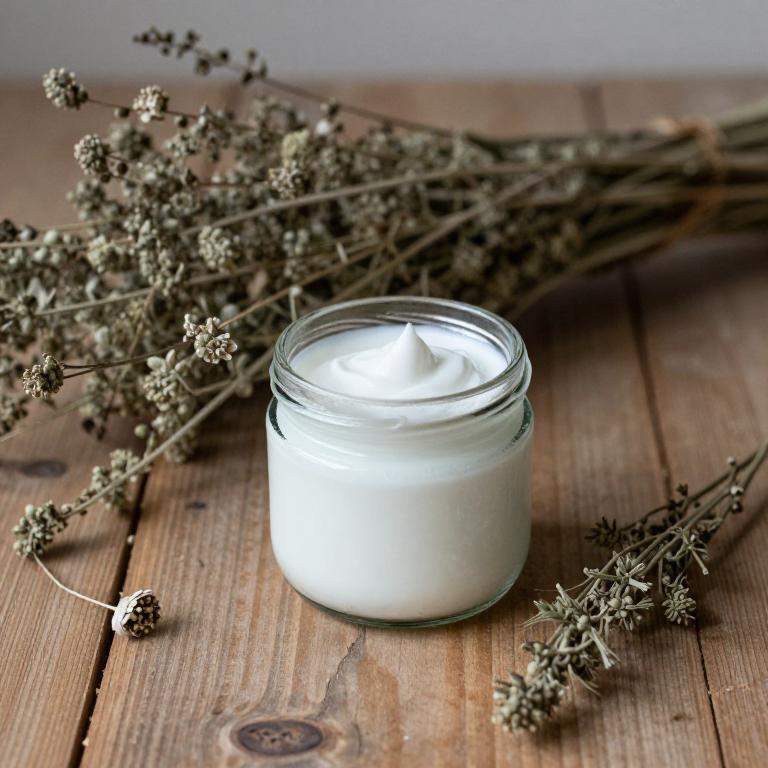
Equisetum arvense, commonly known as field horsetail, is a traditional herbal remedy that has been used for centuries to treat various skin conditions, including eczema.
Its high concentration of silica and other bioactive compounds makes it beneficial for skin healing and hydration. When incorporated into herbal creams, equisetum arvense can help reduce inflammation, soothe irritated skin, and promote the regeneration of the skin barrier. These creams are often favored for their natural ingredients and minimal risk of side effects compared to synthetic treatments.
However, it is important to consult a healthcare professional before using equisetum-based products, especially for individuals with sensitive skin or underlying health conditions.
7. Marigold (Calendula officinalis)
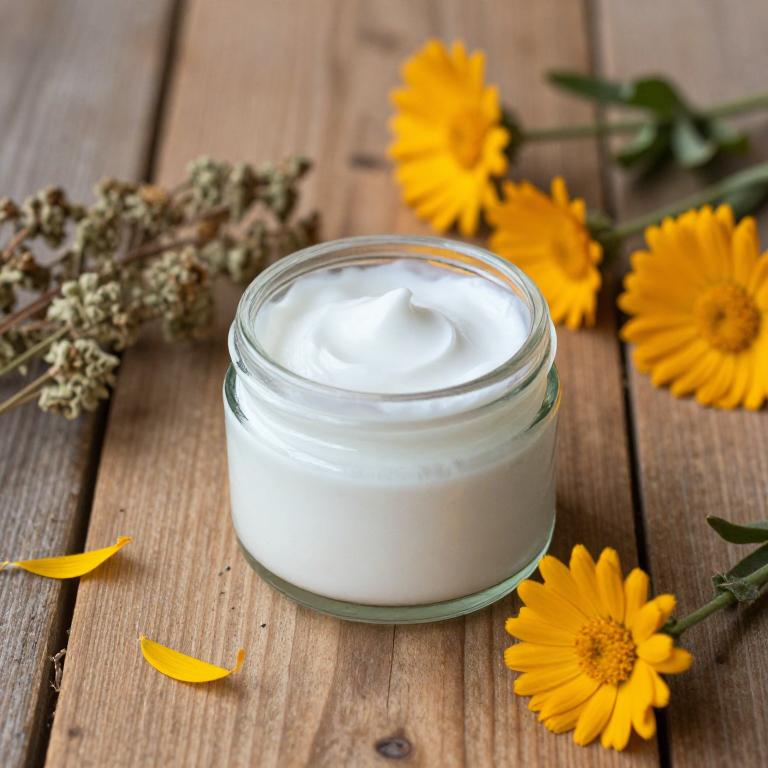
Calendula officinalis, commonly known as pot marigold, is a popular herbal ingredient used in the formulation of creams for eczema due to its anti-inflammatory and antimicrobial properties.
These creams often contain calendula extract, which helps to soothe irritated skin and promote healing by reducing redness and itching. The natural compounds in calendula, such as flavonoids and triterpenes, contribute to its ability to strengthen the skin’s protective barrier. Many people with eczema find relief from using calendula-based creams as a gentle, non-irritating alternative to conventional treatments.
However, it is important to consult a healthcare provider before starting any new topical treatment, especially for severe or persistent eczema.
8. Common mallow (Symphytum officinale)
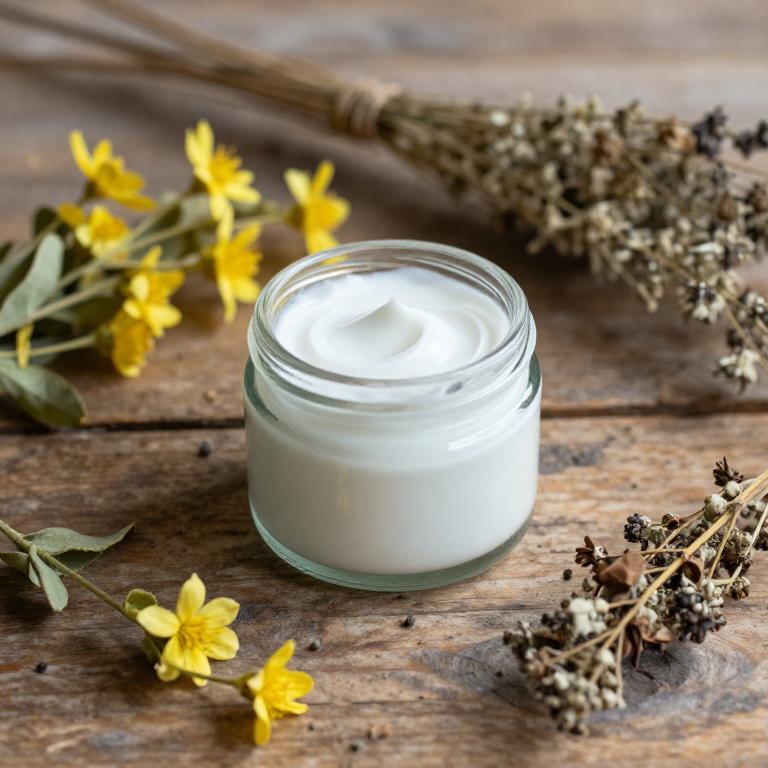
Symphytum officinale, commonly known as comfrey, is a traditional herbal remedy often used in the formulation of creams for eczema due to its potential anti-inflammatory and skin-soothing properties.
These creams typically contain extracts from the roots of the plant, which are believed to promote tissue repair and reduce redness and irritation associated with eczema. While some studies suggest that comfrey may help in healing damaged skin, there are concerns about its safety, particularly regarding the presence of pyrrolizidine alkaloids, which can be toxic to the liver if absorbed through the skin. As a result, many herbal creams containing Symphytum officinale are recommended for external use only and should be avoided by pregnant women, nursing mothers, and individuals with liver conditions.
Despite these precautions, some people find relief from eczema symptoms using comfrey-based creams, making it a popular choice in alternative medicine for skin care.
9. German chamomile (Chamomilla recutita)
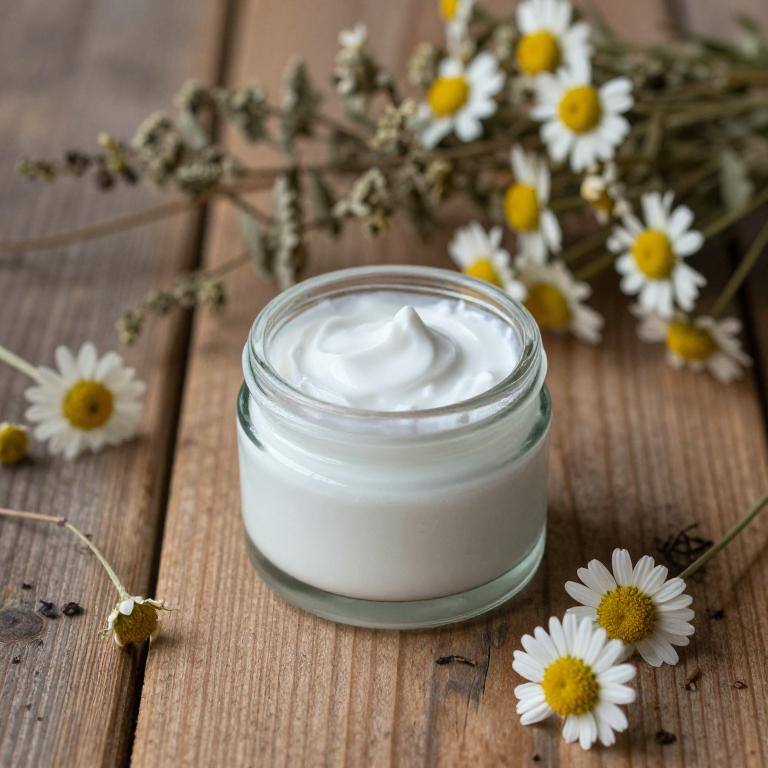
Chamomilla recutita, commonly known as German chamomile, is often used in herbal creams for its soothing and anti-inflammatory properties.
These creams are popular for treating eczema due to their ability to calm irritated skin and reduce redness. The active compounds in chamomile, such as bisabolol and chamazulene, help to alleviate itching and promote skin healing. Many people with eczema find relief using chamomile-based creams as a natural alternative to conventional treatments.
However, it is important to consult a healthcare professional before using these products, especially if you have a known allergy to plants in the daisy family.
10. Camellia (Camellia sinensis)
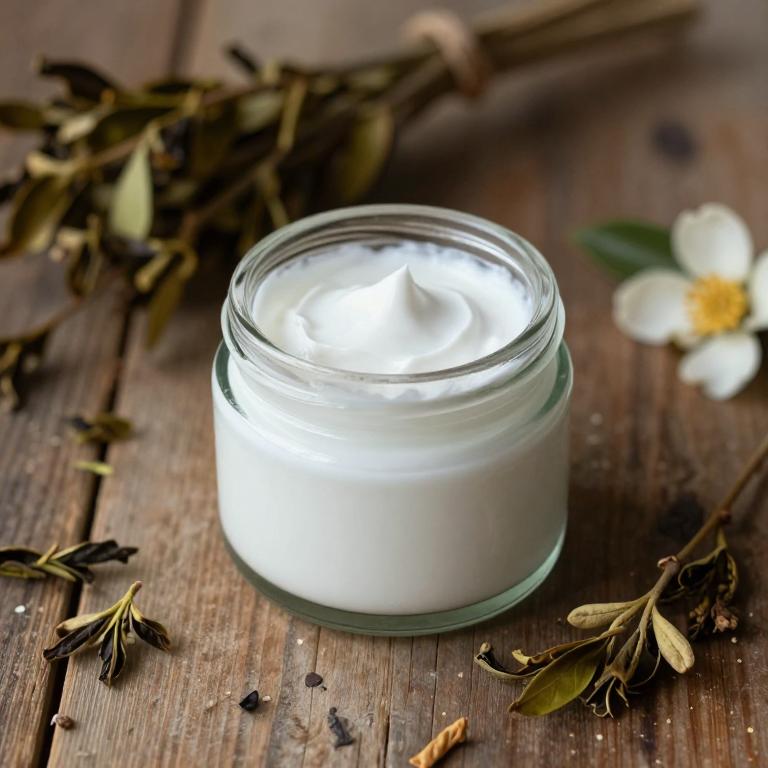
Camellia sinensis, the plant from which green and black teas are derived, is increasingly being incorporated into herbal creams formulated for eczema due to its anti-inflammatory and antioxidant properties.
These creams often contain extracts from Camellia sinensis that help soothe irritated skin and reduce redness associated with eczema. The polyphenols in the plant are believed to support skin health by enhancing the skin's barrier function and reducing oxidative stress. While some users report relief from symptoms when using these creams, it is important to consult a healthcare professional before incorporating them into a skincare routine, as individual reactions may vary.
Overall, Camellia sinensis-based creams offer a natural alternative for managing eczema, though their effectiveness can depend on the specific formulation and the severity of the condition.